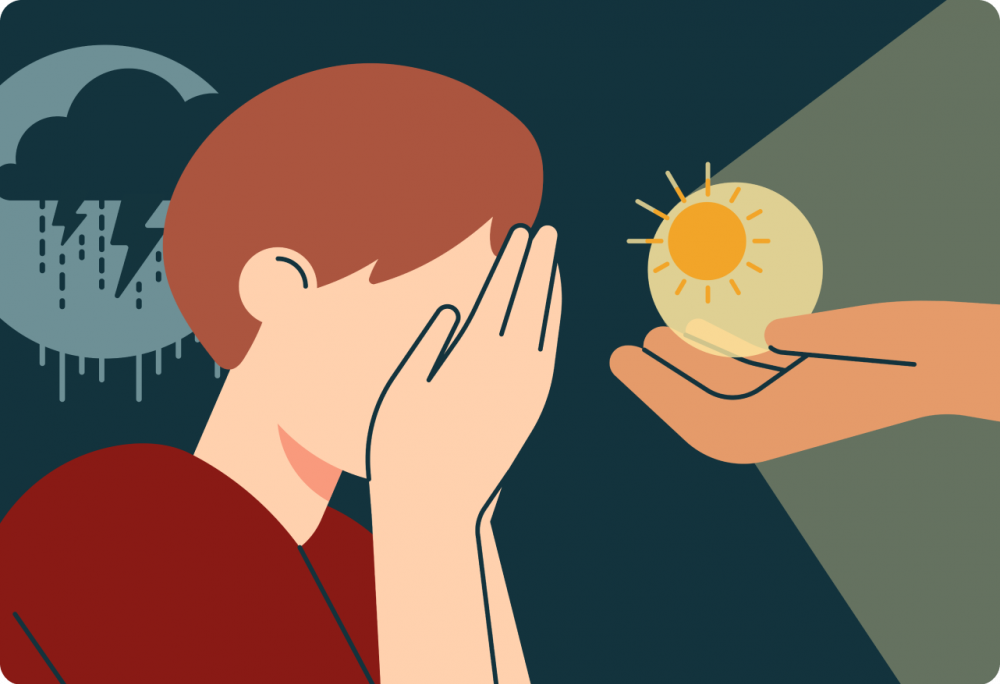Twogether Against Depression
“Mental illness is not a trend, something you can snap out of, a choice, attention seeking, an excuse nor always visible.”
This is but one of the many encouraging quotes I get in my inbox every morning from The Depression Project, which “emails over 50,000 people a supportive, encouraging quote to help them through their depression.”
Mental illness is complex, invisible, unpredictable and doesn’t have a universal appearance. (The Depression Project)
I’m a mental health advocate. While I do not suffer from any psych disorder I’ve come to appreciate the daily easy-to-digest quotes.
To de-jargonaise and de-stigmatise depression, two brothers from Australia have built a platform using layman’s language and illustrations that even a grade school pupil can understand.
Ex-depression sufferer Danny Baker, who once lived in an incessant war zone inside his head for 10 years, tried everything from therapies to antidepressants. But his condition only got unbearably worse to a point where he had terrifying suicidal thoughts that he had to check into a psych ward.
Matthew Baker holds a Master’s Degree in Counseling. He grew increasingly disheartened by the mental health industry he had originally dreamed of entering.
Disenchanted with prevailing mental healthcare practices, the Baker brothers co-founded The Depression Project, a rapidly increasing mental health online platform that encourages people to fight back and take control of their life.
Brothers Danny and Matthew Baker co-founded The Depression Project
Fuelled by their personal reasons, the brothers came to a realisation that those with depression were/are rarely given a clear step-by-step treatment plan. One one hand, sufferers aren’t really getting well and are highly likely to depend on – and increase tolerance for – prescription drugs. On the other, therapies and therapists generally are not focused on patient rehabilitation. It was a cycle that they felt compelled to change.
The Depression Project (TDP) is the Baker brothers’ way of giving those with depression the resources they need to get better, and their loved ones the tools they need to support them effectively. It has amassed a following of over 3 million people across Facebook, Instagram, and TikTok, making it one of the biggest mental health platforms in the world. With a weekly reach of over 10 million, it is helping break the stigma surrounding mental health issues and showing those affected that they're not alone. (source: LinkedIn Matthew Baker)
“I’m proof it’s possible to overcome depression,” Danny exclaims in his bestselling memoir Depression Is A Liar.
The brothers’ journey will resonate with sufferers who are in the same mental state as Danny once was; and with families who feel helpless witnessing the daily struggles their loved ones go through.
Here are excerpts of their story they shared on the TDP site.
Danny: These days, life is very, very good […] I’d beaten my depression for good. Since then, I’ve been happy, healthy and loving my life, and during that time, a lot of incredible things have happened to me!
But, 10 years ago… instead of feeling full of joy and that life was beautiful, I felt scared… and miserable… and ashamed of the person who stared back at me in the mirror.
I found it impossible to be able to construct or even envision a future – and I felt shockingly, shockingly helpless as a result.
I soon lost myself in alcohol, since they seemed like the only remedies that could keep my anguish at bay.
When I finally got sober, I felt so overwhelmed just trying to get through each day that it felt like I was fighting to keep my head above water when it was up to my nose, and the water kept getting deeper, and I’d forgotten how to swim, and there was no-one around to save me, and no matter how much I kicked and struggled and screamed, I just kept sinking.
And after a while, I started thinking: What’s the point of all this? What’s the point of continuing to fight a battle I don’t think I can win?
And over the next 36 months, I felt suicidal on more days than I’ll remember. Due to an antidepressant medication I’d been wrongly prescribed, I developed psychosis, and ended up in a psych ward. I got diagnosed with bipolar disorder. I wound up in hospital for a second time, and I believed with all my heart – that I would never, ever, ever recover.
Danny Baker’s bestselling memoir
So I want to tell you my story – to try my damndest to convince you that just like me, you CAN recover. I want to tell you my story to show you the exact steps you need to follow in order to do so.
And if you’re on the verge of suicide like I’ve been, I want to tell you my story to do my damnedest to convince you to put down the gun. Or to drop the razor blade. Or to put the pills back in the cupboard – because I swear to God life can get better.
I'm proof it's possible to overcome depression, and in my bestselling memoir [Depression Is A Liar], I'll share with you exactly how I did it!
Matthew: To become a therapist, there’s a pretty standard path you’re expected to follow – study for 5 or 6 years, get your qualifications, and then begin working one-on-one with clients. I started along this path studying a Bachelor’s in Psychology, but the deeper I got into it, the more I grew disheartened by the industry I’d originally dreamed of entering.
This disenchantment continued to grow while I did my Master’s of Counselling, and it grew even more so in my early years after graduating, when I worked in a range of settings including in drug and alcohol rehabilitation, with at-risk youth, and in a homeless refuge. By that point in time, my problems with the industry had become crystal clear.
Problem #1. I didn’t like it that clients were rarely given a clear value proposition in their sessions. Put another way, a step-by-step breakdown of what will be covered in each session and how it will help the client overcome depression is usually never provided, and as a result, many clients’ experience of therapy is that it lacks direction, clarity, and worst of all value.
Problem #2. I didn’t like how therapy sessions weren’t subject to any form of quality control, and that they didn’t come with any satisfaction or money-back guarantee. And, when you combine this with Problem #1, it results in people with depression commonly losing $1,000+ on a handful of unhelpful therapy sessions; being unwilling to try again with a different therapist out of fear of losing another $1,000+; and then for lack of any alternative ways to get better, being indefinitely saddled with their depression.
So here’s what I did: To provide a service that was much more patient-friendly, at age 25 I ventured out on my own to start a counselling practice that had three distinguishing features from its traditional counterparts:
The first session would always be free – to give patients a risk-free opportunity to try me out.
After the free first session, I would prepare a detailed treatment plan for the client that would explain exactly why they were suffering from depression, as well as the exact strategies they needed to learn and the actions they needed to take in order to overcome it. Knowing precisely what we’d be covering together in future sessions, they were then free to choose whether they wanted to continue working with me or not.
If they did choose to continue working with me, then not only would they know the exact direction we’d be heading in together, but every session would also be subject to a 100%, no-questions-asked, money-back guarantee – which would ensure that every single session would have built-in quality control, and that people with depression would never have to pay a cent for our therapy sessions together unless it brought them considerable value.
In short, my business model took all of the risk off the client’s shoulders (where 100% of it had traditionally been), and placed it solely on my shoulders as the therapist (where it had never been). And it was a big success! Within three months of starting I had a list of paying clients who loved the service they were receiving, and since all of the sessions took place online, I had the freedom to travel around the world while I helped them overcome depression.
However, as satisfying as it was to have my new practice going so well [...] there was an additional issue that I grew to have with it – and that’s that it wasn’t scalable nor widely accessible.
In other words, because therapists can only work with about 50 clients at any one time, it meant that even though I’d developed a much more patient-friendly system of therapy, it could inherently only ever benefit the tiniest fraction of the world’s patients.
Not only that, but it was also no use to all the people who can’t afford therapy – which as it turns out, is the vast majority of people who struggle with depression. This really bothered me, because I wanted to help everyone. I wanted to help build a world where every single one of the 350 million people who battle this illness have access to the insight, the strategies and the blueprint they need to beat it.
So, instead of continuing to expand my practice […] I gradually wound it down, stopped travelling around the world, and co-founded The Depression Project with my brother Danny. And, in the course of doing so, I’m proud to have:
created the ground-breaking Storm To Sun Framework which makes it easier for people to understand their depression […]
created Depression School which takes all strategies that people would pay tens of thousands of dollars to learn in therapy and makes them widely available at scale for a fraction of the price […]
Decreased Depression’s Stigma […] The Depression Project […] helping non-sufferers better understand depression —having had our social media which educate about the illness being viewed over two billion times.
The next time you – or someone close to you – show signs of depression, don’t dismiss it. It’s not something you can snap out of. As the Baker brothers pointed out: “Mental illness is complex, invisible, unpredictable and doesn’t have a universal appearance.”
Debbie | ws
Images: The Depression Project | Depression School | Contact
Books by Danny and Matthew Baker: Depression Is A Liar | Actually, I’m Not Okay | This Is How You Overcome Depression | How To Support A Loved One With Depression | Blogs








